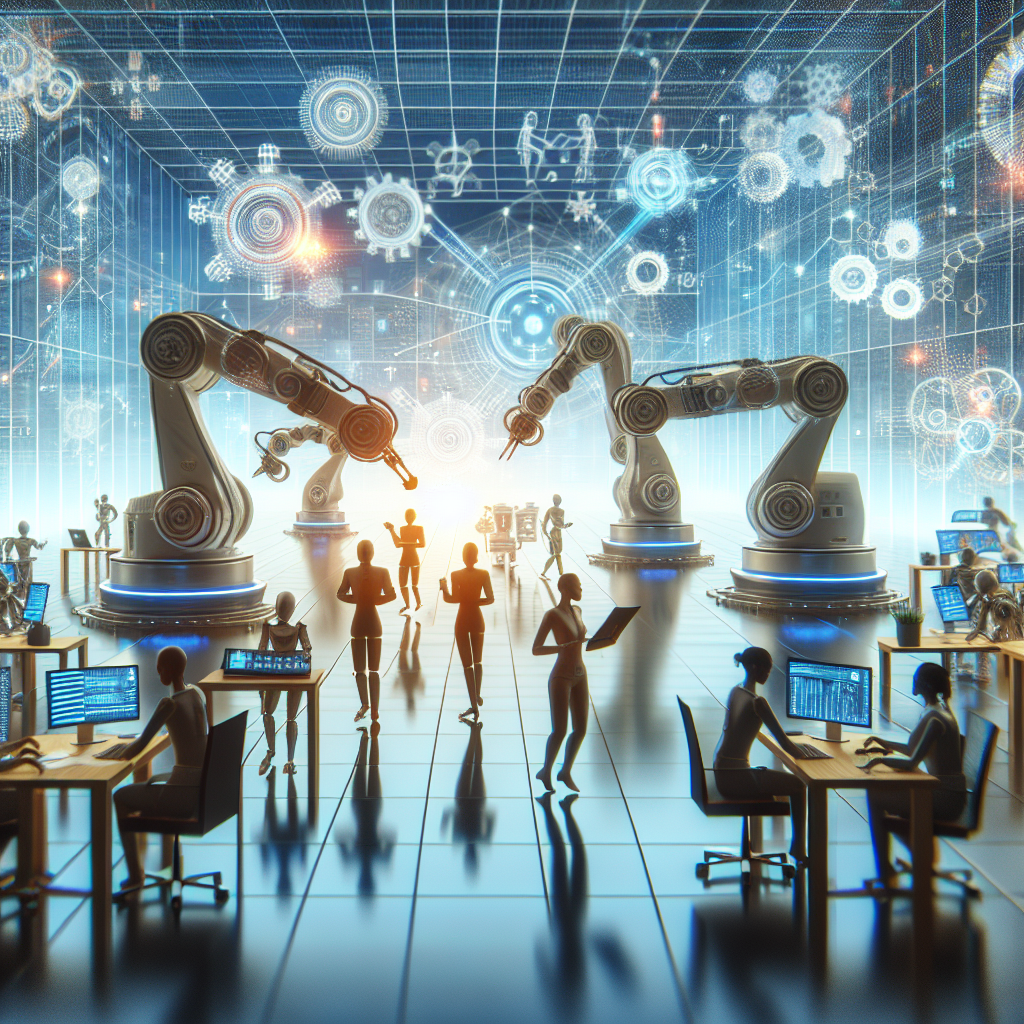Artificial General Intelligence (AGI) is a term that refers to a type of artificial intelligence (AI) that possesses the ability to understand and learn any intellectual task that a human being can. Unlike narrow AI, which is designed to perform specific tasks, AGI has the potential to revolutionize industries by automating complex cognitive tasks that were previously thought to be beyond the capabilities of machines.
In the workplace, AGI has the potential to transform the way we work, increasing efficiency, productivity, and innovation across a wide range of industries. From healthcare to finance, manufacturing to transportation, AGI has the power to revolutionize the way we do business.
In this article, we will explore how AGI is shaping the future of work, its potential impact on industries, and the challenges and opportunities it presents. We will also address some frequently asked questions about AGI in the workplace.
The Impact of AGI on Industries:
1. Healthcare: AGI has the potential to revolutionize healthcare by enabling faster and more accurate diagnosis, personalized treatment plans, and efficient drug discovery. With AGI, doctors can access vast amounts of medical data and research to make informed decisions, leading to improved patient outcomes and reduced healthcare costs.
2. Finance: In the finance industry, AGI can be used to analyze complex financial data, predict market trends, and automate trading strategies. AGI-powered algorithms can help financial institutions make better investment decisions, manage risk, and detect fraud more effectively.
3. Manufacturing: AGI can optimize production processes, improve quality control, and enable predictive maintenance in the manufacturing industry. By integrating AGI into manufacturing systems, companies can reduce costs, increase productivity, and deliver products faster to market.
4. Transportation: AGI can enhance safety, efficiency, and sustainability in the transportation sector. Self-driving cars, drones, and smart traffic management systems powered by AGI can reduce accidents, congestion, and emissions, transforming the way we travel and commute.
5. Retail: AGI can personalize customer experiences, optimize inventory management, and streamline supply chain operations in the retail industry. By leveraging AGI, retailers can deliver targeted marketing campaigns, improve customer satisfaction, and drive sales growth.
Challenges and Opportunities of AGI in the Workplace:
While AGI holds immense potential for transforming industries, it also poses challenges that need to be addressed to realize its full benefits. Some of the key challenges of AGI in the workplace include:
1. Ethical concerns: AGI raises ethical questions around data privacy, algorithmic bias, and job displacement. Companies need to establish ethical guidelines and regulations to ensure that AGI is used responsibly and ethically in the workplace.
2. Skills gap: The adoption of AGI will require a skilled workforce capable of designing, implementing, and managing AI systems. Companies need to invest in training and upskilling programs to equip employees with the necessary skills to work alongside AGI.
3. Security risks: AGI systems are vulnerable to cyberattacks, data breaches, and manipulation. Companies need to implement robust cybersecurity measures to protect their AGI systems and data from malicious actors.
4. Regulatory compliance: AGI raises regulatory challenges around data protection, intellectual property rights, and liability. Companies need to comply with existing regulations and collaborate with policymakers to develop new frameworks that address the unique challenges of AGI.
Despite these challenges, AGI also presents opportunities for businesses to innovate, grow, and thrive in the digital age. Some of the key opportunities of AGI in the workplace include:
1. Increased productivity: AGI can automate routine tasks, optimize processes, and augment human decision-making, leading to increased productivity and efficiency in the workplace.
2. Innovation: AGI enables companies to develop innovative products, services, and business models that drive competitive advantage and market differentiation.
3. Cost savings: AGI can reduce operational costs, improve resource allocation, and optimize performance, leading to significant cost savings for businesses.
4. Improved decision-making: AGI can analyze vast amounts of data, identify patterns, and generate insights that enable better decision-making and strategic planning in the workplace.
Frequently Asked Questions about AGI in the Workplace:
1. What is the difference between AGI and narrow AI?
AGI refers to artificial intelligence that possesses the ability to understand and learn any intellectual task that a human can, while narrow AI is designed to perform specific tasks or functions within a limited domain. AGI has the potential to generalize across a wide range of tasks and adapt to new challenges, whereas narrow AI is specialized and focused on a specific task or problem.
2. How will AGI impact jobs and the workforce?
AGI has the potential to automate routine tasks, augment human capabilities, and create new job opportunities in emerging fields such as AI engineering, data science, and robotics. While some jobs may be displaced by AGI, new roles will be created that require human skills such as creativity, critical thinking, and emotional intelligence.
3. How can companies prepare for the adoption of AGI in the workplace?
Companies can prepare for the adoption of AGI by investing in training and upskilling programs, developing ethical guidelines and regulations, implementing robust cybersecurity measures, and collaborating with policymakers to address regulatory challenges. By proactively preparing for the adoption of AGI, companies can leverage its potential benefits and drive innovation in their industries.
4. What are the ethical considerations of AGI in the workplace?
Ethical considerations of AGI in the workplace include data privacy, algorithmic bias, job displacement, and accountability. Companies need to establish ethical guidelines and regulations to ensure that AGI is used responsibly and ethically, and that its benefits are distributed equitably among employees, customers, and stakeholders.
In conclusion, AGI has the potential to revolutionize industries by automating complex cognitive tasks, increasing efficiency, and driving innovation in the workplace. While AGI poses challenges such as ethical concerns, skills gap, security risks, and regulatory compliance, it also presents opportunities for businesses to innovate, grow, and thrive in the digital age. By addressing these challenges and leveraging the opportunities of AGI, companies can unlock its full potential and shape a future where humans and machines work together to achieve new heights of success and prosperity.

